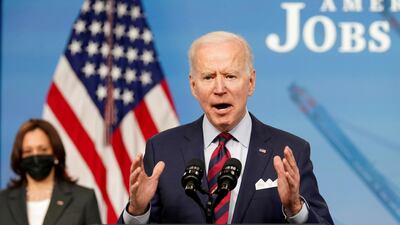US President Joe Biden will seek $6 trillion in US federal spending for the 2022 fiscal year, rising to $8.2tn by 2031, The New York Times reported on Thursday, a day before the White House is expected to unveil its budget proposal.
Citing documents it had obtained, The New York Times said the Democratic president planned to pay for his agenda through increased taxes on corporations and high earners, and that the budget deficits would start to decrease in the 2030s.
On Friday, Mr Biden will release his first full budget since taking office in January as he seeks to push his priorities of investing in infrastructure, childcare and other public works in a national rebuilding effort.
Mr Biden's proposal would put the nation on track for its highest sustained level of spending since the Second World War.
Republicans criticised the president for seeking trillions in new spending, setting the stage for pitched battles over his priorities.
"It just seems like the trillions keep on coming," Shelley Moore Capito, who is leading a group of Republican senators pursuing a counter-offer to Mr Biden's current $1.7tn infrastructure proposal.
Mr Biden visited Ohio on Thursday to publicise the infrastructure plan and tout the latest economic figures, which show a fast-growing economy.
"Covid cases are down, deaths are down, unemployment filings are down, hunger is down," he said.
"Vaccinations are up, jobs, real growth is up, people getting health coverage is up, small business confidence is up."
Treasury Secretary Janet Yellen said on Thursday that Mr Biden's upcoming spending plan would push the record US national debt even higher, but not beyond the country's means.
Speaking during an oversight hearing at the House Appropriations Committee, Ms Yellen did not give details of the budget but acknowledged that under the proposal, the US debt-to-GDP ratio is expected "to rise a little bit higher" from the 100.1 per cent of gross domestic product reached in 2020.
She argued, however, that with average inflation and treasury bond yields both low, the country can afford to take on the debt.
While the president can propose an annual budget for the US government, it is up to Congress to approve spending bills.
And while Democrats hold the majority in the US House of Representatives, they only narrowly control the 50-50 divided US Senate, with Democratic Vice President Kamala Harris holding the tie-breaking vote.
Still, Mr Biden campaigned on charting a new course for the country after four divisive years under his Republican predecessor, Donald Trump, and has vowed to press ahead with his sweeping proposals.
His plan will offer more details on that path, including possible spending jumps in Medicaid and other social programmes. It will also lay out proposed funding for foreign aid, immigration, policing and national defence.

